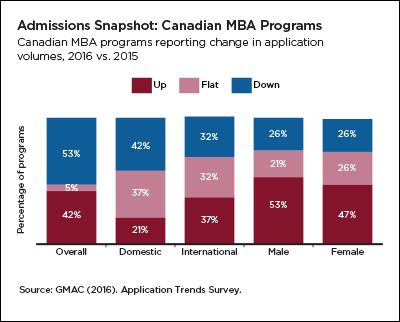The majority of applications to Canadian MBA programs in 2016 came from international candidates.

A record total of 872 graduate business school programs at 336 universities around the world participated in the
2016 Application Trends Survey. This regional spotlight provides a close examination of data submitted by 20 MBA programs located at 14 universities in Canada. The sample consists of survey responses from 12 full-time MBA programs (seven two-year MBA and five one-year MBA) and eight professional MBA programs (six part-time MBA, one flexible MBA, and one executive MBA).
Note: Due to the small number of programs responding, findings should be interpreted with caution.
Application Volume Trends
Overall, more than half of responding Canadian MBA programs (53%) received fewer applications in 2016 than they did in 2015. Forty-two percent of programs report receiving more applications this year compared with last year, and five percent indicate there was no change in their application volume. Six of 12 reporting full-time MBA programs report growing application volumes this year compared with only 2 in 7 professional MBA programs (one reporting professional MBA program is in its first year and could not provide data on application volume change).
The 20 responding Canadian MBA programs report receiving a median of 183 applications each. With a median estimated class size of 70, this means programs received 2.7 applications per seat, on average. The estimated acceptance rate—the number of acceptance offers divided by the number of total completed applications—is 56 percent. The estimated enrollment rate—the number of accepted applicants who enroll divided by the number of all accepted applicants—is 66 percent.
Applicant Profile
For the incoming class of 2016–2017, the majority of applications (51%) to Canadian MBA programs are from international candidates (citizens of other countries). Overall, 49 percent of applicants are domestic candidates (Canadian citizens). International applicants to Canadian MBA programs are most often from the world regions of Central and South Asia (23% of total applicants) and East and Southeast Asia (11%). By specific countries, most Canadian MBA programs indicate that the greatest number of international candidates are from India and China. Smaller proportions of international applicants hail from Africa (7%), the Middle East (4%), and Latin America (3%).
Seven in 10 applicants to Canadian MBA programs (70%) have three or more years of work experience. On the basis of work experience, applicants to full-time MBA programs differ notably from candidates for professional MBA programs. More than a third (37%) of applicants to full-time MBA programs have less than three years’ experience; the same is true of just 18 percent of professional MBA applicants. In comparison, 40 percent of applicants to professional MBA programs have six or more years’ experience versus just 25 percent of full-time MBA applicants.
Overall, 63 percent of applicants to responding Canadian MBA programs are male and 37 percent are female, a gender split exactly on par with the global average for MBA programs. The majority of Canadian MBA programs (53%) report receiving more applications in 2016 from men than they did last year. Fewer programs (47%) report year-on-year application volume growth from women.

Recruitment and Outreach
To ensure a diverse and high-quality pool of students for their incoming class, MBA programs around the world conduct special outreach and recruitment of targeted populations. A majority of the reporting Canadian MBA programs report that they engage in specialized outreach to working professionals (84% of programs), international candidates (68%), women (63%), and occupational specialties (53%), such as individuals with STEM backgrounds.
These programs also conduct targeted outreach to undergraduate candidates. About 1 in 3 programs specifically target non-business major undergrads (32% of programs), and a quarter of programs say they target business major undergrads (26%). Sixteen percent of programs have a specialized outreach plan for LGBT candidates.
For more information on international application volume trends in graduate management education, as well as data related to targeted candidate outreach, tuition assistance, and employer funding, download the 2016 Application Trends Survey Report, available now at gmac.com/applicationtrends. For more regional analyses, read Application Trends 2016: Regional Spotlight on India and Application Trends 2016: Regional Spotlight on Africa.